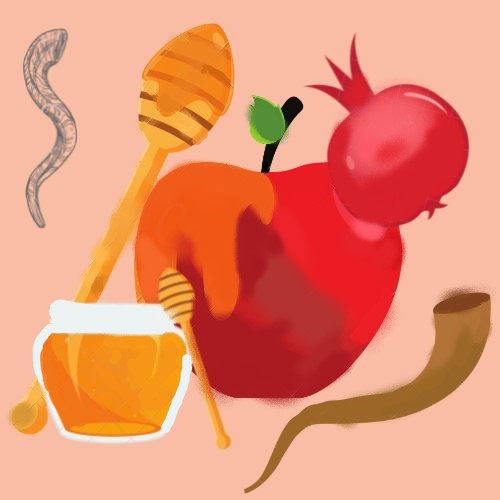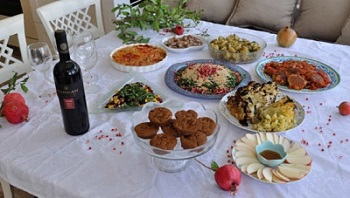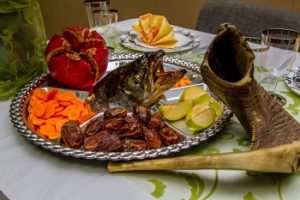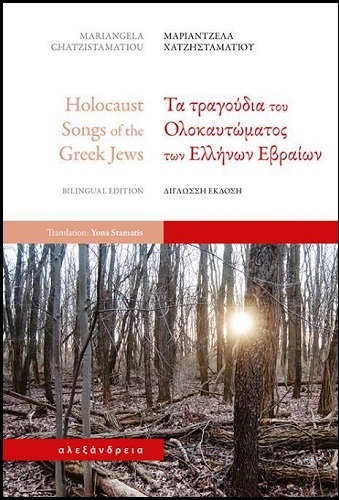
By Avner Azoulay
Rosh Hashanah (ראש השנה) is a holiday marking the beginning of the Jewish New Year. It is celebrated, in Israel as well as in the Diaspora, on the first two days of the month of tichri which occurs, depending on the year, in September or October.
Called in the Bible Zikhron Teruʿa (Remembrance of the Ringing) (Lev 23:24) or Yom Teruʿa (Day of the Ringing), (Num 29:1), Rosh Hashanah is marked by the sounding of the shofar (ram’s horn), which symbolizes the sacrifice of Isaac and G-d’s Covenant with Abraham’s children. In the oral tradition, the two days of Rosh Hashanah become the days of judgment, introducing a ten-day period of penitence (Asheret’ Yemei Tshuva) in anticipation of the great forgiveness (Yom Kippur).
Symbolism of Rosh Hashanah Seder

The Seder table thus includes foods that evoke, sometimes with puns, the year that we hope will be sweet and happy. Sour or pungent foods are thus avoided in favor of sweet foods, such as apples dipped in honey. This custom, mentioned in the Talmud, has undergone various versions and was strongly developed by the Kabbalists of Safed.
Rosh Hashanah Seder ritual

These foods were chosen because their Aramaic names resonated with Hebrew wishes for the New Year. A prayer accompanies the consumption of each of these foods. It is sung to a tune that varies according to the community, while holding the food in the right hand, immediately before eating it.
Blessings and songs
After chanting kiddush, washing, and breaking bread, the following foods are eaten:
- Dates (מרים)
Take a date and recite:
בָּרוּךְ אַתָּה ה’ אֱלֹהינוּ מֶלֶךְ הָעוֹלָם בּוֹרֵא פְּרִי הָעֵץ
Baruch atah Adonai, Eloheinu melech ha-olam, borei p’ri ha-eitz.
Blessed are You, Lord our G‑d, King of the universe, who creates the fruit of the tree.
AUDIO 1 : Blessing of the 1st date – Avner Azoulay
Audio Player
After eating the date, take another one and say:
יְהִי רָצוֹן מִלְּפָנֶיךָ ה’ אֱלֹהינוּ וֵאלֵֹהי אֲבוֹתֵינוּ, שֶׁיִּתַּמּוּ אוֹיְבֵינוּ וְשׂוֹנְאֵינוּ וְכָל מְבַקְשֵׁי רָעָתֵנוּ
Yéhi ratsone milefanekha Ado-naï Elo-hénou vElo-hé avoténou, chéyitamou oïvénou vessonénou vekhol mevakché ra’aténou (phonetics in French)
May it be Your will, Lord our G‑d and the G‑d of our fathers, that there come an end to our enemies, haters and those who wish evil upon us.
AUDIO 2 : Blessing of the 2nd date – Avner Azoulay
Audio Player
- White beans (רוביא—לוביא)
(The following blessing over vegetables is only recited if one has not recited the blessing over bread).
בָּרוּךְ אַתָּה ה’ אֱלֹהינוּ מֶלֶךְ הָעוֹלָם בּוֹרֵא פְּרִי הָאֲדָמָה
Barou’h ata Ado-naï Elo-hénou mélè’h haolam boré peri haadamah (phonetics in French)
Blessed are You, Lord our G‑d, King of the universe, who creates the fruit of the earth.
AUDIO 3 : Blessing before the white beans – Avner Azoulay
Audio Player
Take some white beans and say:
יְהִי רָצוֹן מִלְּפָנֶיךָ ה’ אֱלֹהינוּ וֵאלֵֹהי אֲבוֹתֵינוּ, שֶׁיִּרְבּוּ זָכִיּוֹתֵינוּ וּתְלַבְּבֵנוּ
Yéhi ratsone milefanekha Ado-naï Elo-hénou vElo-hé avoténou, chéyirbou zakhouyoténou outelabevénou (phonetics in French)
May it be Your will, Lord our G‑d and the G‑d of our fathers, that our merits shall increase and that You hearten us.
AUDIO 4 : Blessing of the white beans – Avner Azoulay
Audio Player
- Leek (כרתי)
Take a leek and say:
יְהִי רָצוֹן מִלְּפָנֶיךָ ה’ אֱלֹהינוּ וֵאלֵֹהי אֲבוֹתֵינוּ, שֶׁיִּכָּרְתוּ אוֹיְבֵינוּ וְשׂוֹנְאֵינוּ וְכָל מְבַקְשֵׁי רָעָתֵנוּ
Yéhi ratsone milefanekha Ado-naï Elo-hénou vElo-hé avoténou, chéyikhretou oïvénou vessonénou vekhol mevakché ra’aténou (phonetics in French)
May it be Your will, Lord our G‑d and the G‑d of our fathers, that our enemies, haters, and those who wish evil upon us shall be cut down.
AUDIO 5 : Blessing of the leeks – Avner Azoulay
Audio Player
- Beets (סלקא)
Take a beet and say:
יְהִי רָצוֹן מִלְּפָנֶיךָ ה’ אֱלֹהינוּ וֵאלֵֹהי אֲבוֹתֵינוּ, שֶׁיִּסְתַּלְּקוּ אוֹיְבֵינוּ וְשׂוֹנְאֵינוּ וְכָל מְבַקְשֵׁי רָעָתֵנוּ
Yéhi ratsone milefanekha Ado-naï Elo-hénou vElo-hé avoténou, chéyistalkou oïvénou vessonénou vekhol mevakché ra’aténou (phonetics in French)
May it be Your will, Lord our G‑d and the G‑d of our fathers, that our enemies, haters and those who wish evil upon us shall depart.
AUDIO 6 : Blessing of the Beets – Avner Azoulay
Audio Player
- Gourd (קרא)
Take a gourd and say:
יְהִי רָצוֹן מִלְּפָנֶיךָ ה’ אֱלֹהינוּ וֵאלֵֹהי אֲבוֹתֵינוּ, שֶׁתִּקְרַע רוֹעַ גְּזַר דִּינֵנוּ, וְיִקָּרְאוּ לְפָנֶיךָ זָכִיּוֹתֵינוּ
Yéhi ratsone milefanekha Ado-naï Elo-hénou vElo-hé avoténou, chétikra’ ro’a gzar dinénou, veyikarou lefanekha zakhiyoténou (phonetics in French)
May it be Your will, Lord our G‑d and the G‑d of our fathers, that the evil of our verdicts be ripped, and that our merits be announced before you.
AUDIO 7 : Blessing of the Gourd – Avner Azoulay
Audio Player
- Pomegranate (רימון)
Take the pomegranate and say:
יְהִי רָצוֹן מִלְּפָנֶיךָ ה’ אֱלֹהינוּ וֵאלֵֹהי אֲבוֹתֵינוּ, שֶׁנִּהְיֶה מְלֵאִים מִצְוֹת כָּרִמּוֹן
Yéhi ratsone milefanekha Ado-naï Elo-hénou vElo-hé avoténou, chénihyé meléïm mitsvot karimone (phonetics in French)
May it be Your will, Lord our G‑d and the G‑d of our fathers, that we be filled with mitzvot like a pomegranate [is filled with seeds].
AUDIO 8 : Blessing of the Pomegranate – Version 1 – Avner Azoulay
Audio Player
Some people say instead:
יְהִי רָצוֹן מִלְּפָנֶיךָ ה’ אֱלֹהינוּ וֵאלֵֹהי אֲבוֹתֵינוּ, שֶׁיִּרְבּוּ זָכִיּוֹתֵינוּ כָּרִמּוֹן
Yéhi ratsone milefanekha Ado-naï Elo-hénou vElo-hé avoténou, chéyirbou zakhiyoténou karimone (phonetics in French)
May it be Your will, Lord our G‑d and the G‑d of our fathers, that our merits multiply like [the seeds of] the pomegranate.
AUDIO 9 : Blessing of the Pomegranate – Version 2 – Avner Azoulay
Audio Player
- Apple and Honey (תפוח בדבש)
Dip an apple in honey – some have the custom of using an apple cooked with sugar – and say:
יְהִי רָצוֹן מִלְּפָנֶיךָ ה’ אֱלֹהינוּ וֵאלֵֹהי אֲבוֹתֵינוּ, שֶׁתְּחַדֵּשׁ עָלֵינוּ שָׁנָה טוֹבָה וּמְתוּקָה כַּדְּבָשׁ
Yéhi ratsone milefanekha Ado-naï Elo-hénou vElo-hé avoténou, chéte’hadech alénou chana tova oumetouka kadevach (phonetics in French)
May it be Your will, Lord our G‑d and the G‑d of our fathers, that You renew for us a year good and sweet like honey.
AUDIO 10 : Blessing of the Apple – Avner Azoulay
Audio Player
- Ram’s Head (or the head of another kosher animal or fish) (ראש כבש)
Take some flesh and sing the following blessing:
יְהִי רָצוֹן מִלְּפָנֶיךָ ה’ אֱלֹהינוּ וֵאלֵֹהי אֲבוֹתֵינוּ, שֶׁנִּהְיֶה לְרֹאשׁ וְלֹא לְזָנָב
Yéhi ratsone milefanekha Ado-naï Elo-hénou vElo-hé avoténou, chénihyé leroch velo lezanav (phonetics in French)
May it be Your will, Lord our G‑d and the G‑d of our fathers, that we be a head and not a tail.
AUDIO 11 : Blessing of the head of a ram (or a fish) – Avner Azoulay
Audio Player
The following is added only over the head of a ram:
וְתִזְכֹּר לָנוּ עֲקֵדָתוֹ וְאֵילוֹ שֶׁל יִצְחָק אָבִינוּ בֶּן אַבְרָהָם אָבִינוּ עַלֵיהֶם הַשָּׁלוֹם
…vetizkor lanou akédato chel Yits’hak avinou ben Avraham avinou aléhèm hachalom (phonetics in French)
…And You shall remember for us the binding and the ram of our forefather Isaac, the son of our forefather Abraham, peace be onto them.
AUDIO 12 : Blessing of the head of a ram – 2nd part – Avner Azoulay
Audio Player
You will find in the player below the recordings of these blessings slightly more ornate in the traditional Moroccan rite.
Enjoy, and … Shana Tovah!
Browse other articles on our website about Rosh Hashanah music
Consult our musical collections on Rosh Hashanah



